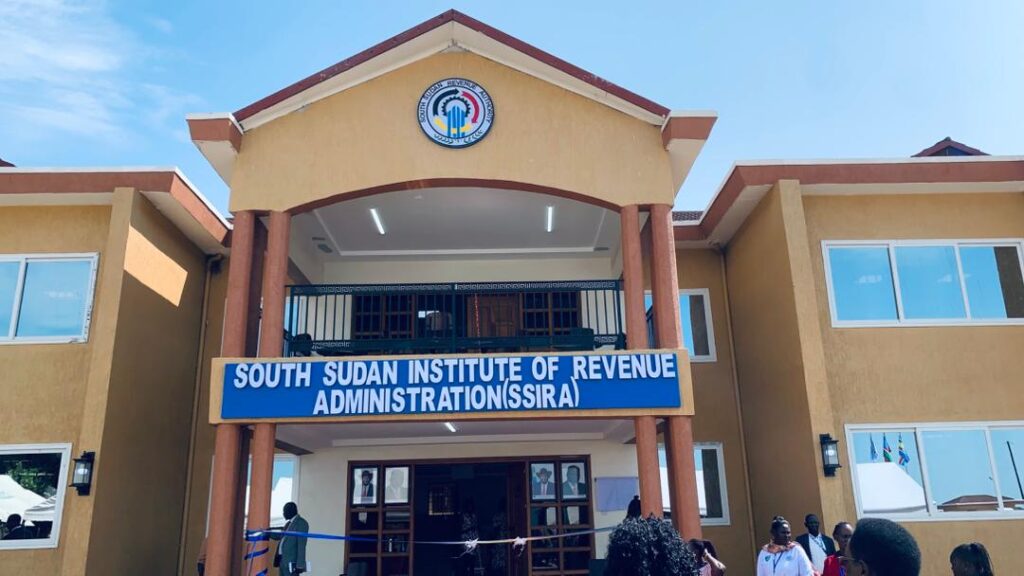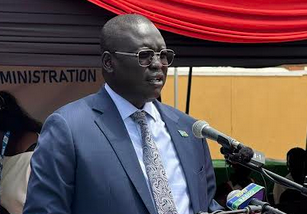The South Sudan Revenue Authority (SSRA) on Tuesday launched the Institute of Revenue Administration and Non-Oil Revenue Mobilization and Accountability Phase II (NORMA-II) project to strengthen the collection of revenue.
The US$14.31 million project funded by African Development Bank Group aims to strengthen non-oil revenue mobilization, enhance transparency, and promote sustainable domestic resource generation.
Speaking during the ceremony on Tuesday, South Sudan Revenue Authority Commissioner General Simon Akuei Deng said the two projects mark a significant step in building a more resilient, inclusive, and self-sustaining national economy.
“These two initiatives reflect not just technical projects, but national investment in revenue modernization, diversification, and sustainability,” he said. “They form an essential part of the broader national agenda, focused on enhancing trade facilitation, expanding economic connectivity, and promoting sustainable development across the Republic of South Sudan.”
Akuei said that non-oil revenue collections have increased from SSP 700 million in the financial year 2017-18 to over 984.4 million in 2024-2025.
“Through the capacity building initiative, we have developed a skilled staff capability level of overseeing national tax and customs administration,” he disclosed. “Through the non-revenue collections, non-oil revenue collections have increased from 700 million SSP in the financial year 2017-18 to over 984.4 million SSP in the fiscal year 2024-2025. This increase has demonstrated the effectiveness of reforms and the widening of our national tax base. These revenues are now supported by essential public services and infrastructure development.”
“We are working together, my colleagues, the deputy commissioner, the commissioners, and the entire staff, to be able to increase the non-oil revenues, or revenues in general,” Akuei added.
He noted that South Sudan’s economy has been overwhelmingly dependent on oil revenues, which have supported the state’s functions and national development since independence.
“This reliance has exposed us to serious vulnerabilities, volatile global oil prices, production disruptions, and the physical unpredictability that follows,” he stated.

For his part, Mr. Abdoulaye Coulibaly, Director of Governance and Economic Reforms Department at the African Development Group (AfDB), said the objective of the project is to strengthen and build the capacity of South Sudan Revenue Authority to increase non-oil revenue mobilization and accountability.
“The bank has been part of the journey of established and effective revenue administration since 2017, with the bank’s financial and technical assistance of US$15.62 million to the government of South Sudan, and the project for oil, non-oil revenue mobilization and accountability,” he said.
He said the key intervention of the NORMA II project will be to build the SSRA IT system to further enhance tax administration, including tax collection and promoting voluntary taxpayer compliance.
“This project, what we are launching today, is the second phase of NORMA, with additional resources of US$6.5 million, including the contribution for the establishment of the Institute of SRA with equipment, furniture, and training,” he revealed. “The objective of NORMA II is to strengthen and build the capacity of South Sudan Revenue Authority to increase non-oil revenue mobilization and accountability.”
Meanwhile, Paulino Lukudu Obede, the Deputy Governor of Central Equatoria State, said the institute will address tax harmonization, collection of taxes, and diversification of the economy.
“This will address a lot of issues, and also it will strengthen the capacity of the government offices to understand very important issues, which starts with issues with our laws, the constitution, the Local Government Act, the state’s constitution, the transitional constitution, the regional treaties, and international laws related with issues to do with public finance management,” he said. “It will also address issues related to tax harmonization, collection of taxes, and diversifying of the economy, as well as governmental linkages.”
Lorna Merekaje, Secretary General of the South Sudan Democratic Engagement, Monitoring, and Observation Program, said the institution will impact employees with scientific knowledge to boost revenue collection.
“Revenue collection is a very important aspect of public finance management. Having such an institution will bring in the scientific knowledge on how revenue is collected without infringing on citizens’ rights,” she said. “So, I think it’s a very good move.”




